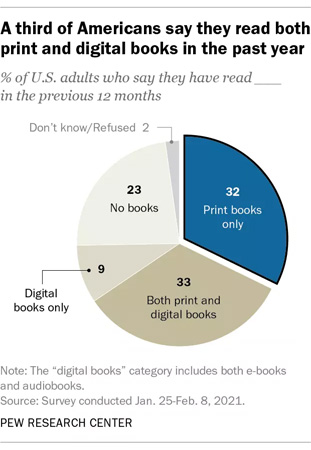
Books are man’s best friend and this quote is surely true, as reading books have always been a great source of knowledge, wisdom and a favorite hobby of millions across the globe. With the changing medium, reading books are now available in different formats. From paperback format to digital audiovisual format, books are available everywhere for everyone. With different presentations, a hot discussion is always seen between Print books Vs eBooks. Everyone has their reasons to use the format they like.
Print books Vs e-books Statistics
If we see the trend closely it shows that e-books are showing an upward surge in the last few months and years. One of the reasons is the pandemic due to which most nations were in complete or partial lockdown. So the digital footprint surely has a great surge. But if the data is seen in print books vs e-books, then print books are very much ahead of e-books. The survey showed that in 2020 in the US only 191 million e-books were sold and 750.89 million print books were sold.

Print books remain the top most choice for readers with almost 65% readers accepting to read a book in paper format. The number of readers for print or paper format books remains more or so constant over the last few years without any significant change. Instead the number of ebook readers has increased from 25% to 30%.
According to the Pew Research center 75% of adults in the US have read a book in any format in the last 12 months. Whereas of these 75%, 65% have read a print or paper format book, 33% adults have read both print and digital books and only 9% have read only ebooks.
Print books Vs e-books
Well it can be an interesting topic for debate amongst readers and non readers too that which format is better Print books Vs ebooks.
Youngsters nowadays are getting more inclined towards the ebooks for many reasons:
- Ebooks are Eco friendly.
- Ebooks are easy to carry as they fit in your gadget easily. So one can have multiple books and subject books at the same time. In paper format it’s difficult to carry many books.
- Ebooks are visually more appealing than paper books, with digital medium going through various innovations, it is also reflected in the way ebooks are presented.
- Ebooks have the option to give direct and instant feedback to the author or the publisher, which indeed is a great way to connect the readers and the authors with each other. It also helps in understanding the demand of the market. Thus beneficial for both the reader (consumer) and the author, publisher (producer).
- Ebooks are cost effective in the long run as they do not get torn or worn out with time. They can be shared easily as a whole or a part that is needed at that particular time.
Despite the many benefits of e-books , the print books or paper format are still the forerunner in popularity and usage. The reason for this includes the old tradition of owning books as a personal possession. The access to e-books is more in urban areas as it is dependent on the socioeconomic status of the reader too.
Suggested Read – Know Everything About An E-book – From What Is An E-book? To Its Benefits

Reader vs E-reader
The readers of books belong to the younger generation in both print or e-books. But if we study closely, the maximum readers for ebooks belong to the age group of 18-29 and least in the age group of 65+ years. The most popular platform for e-books is Amazon’s Kindle. There are two formats present in e-books one is AZW ebook format which is seen in Kindle and the other format which is called EPUB format is seen in Apple Books, Barnes & Noble Nook e-books and others. Kindle rules the ebook market with 72% e-readers. Whereas in the print books moreover the age group doesn’t make much difference.
Reading is a habit or a hobby and both for some. But the access to reading books is dependent on many factors which can be grouped under demographic division like income, age, livelihood etc. Despite the increase in e-readers, print readers are far ahead in numbers which can be easily seen by the data and revenue earned provided by the publishing houses. The total book sales for the year 2019 is $26 billion and out of which 3/4th sales belong to print books. E-book revenue share is 7.48%.
Also Read – How To Market An eBook- Effective Ways
Well for a reader, reading a book is an experience, the medium is very important. That is why in Print books Vs eBooks , the print book mergers as a clear winner. As the reader who belongs to print books focuses on reading a book in paper format which makes the experience realistic and individualistic. That is the sole reason why people feel such a strong connection with print format . Although with changing times people are adapting to e-books too. As in times like pandemic the exchange of information was in loop because of the digital books. So be it any medium the main purpose is to inoculate the habit which helps in gathering knowledge from different nations about their lives and experiences. Thus enriching human behavior and knowledge.






